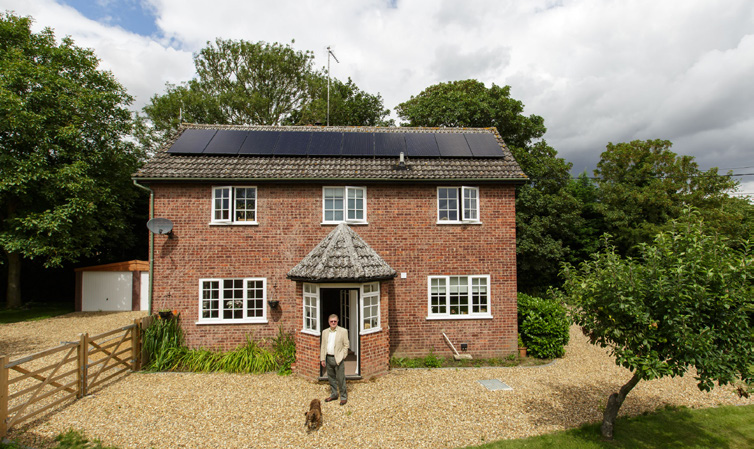The U.K.’s residential solar sector is facing further cost pressures following the publication of new plans by energy regulator Ofgem to increase network charges for PV households.
The plans are part of a wider overhaul of the U.K.’s electricity network, specifically how it is funded, by 2020. Households currently pay an average of around £120 a year towards maintaining the grid. This figure is levied as part of the unit rate that is charged by utilities for electricity that is supplied to homes via the national grid.
In short, homes that buy more power contribute more in upkeep towards the grid. Solar households obviously buy less power from the grid, because they are able to generate their own electricity for much of the day. Hence, their overall financial contribution to grid upkeep is less than average.
Ofgem is now arguing that this is an unfair situation, particularly in winter when households with solar panels installed will still be as reliant on the national grid as non-solar households.
“We want to make sure that all users pay a fair share of the costs, even if they are only using the networks when their on-site generation is not producing electricity,” said Ofgem senior partner Andrew Wright. The Ofgem proposals are to either make all households pay a fixed charge for connection to the National Grid, or alternatively to link the charge to the maximum capacity drawn from the grid at peak times. If the latter model is adopted, solar homes are likely to pay more than they currently do, while also resulting in lower bills for non-solar consumers.
Another controversial proposal outlined by Ofgem would be to impose a fee on households that want to fast-charge their electric vehicles (EVs) at home during peak times. The regulator’s concerns are that EV charging during peak hours will deliver additional strain on to the grid, thus necessitating costly upgrades in the region of billions of pounds.
“When one set of consumers pays less, it increases charges for others, including those that are in vulnerable circumstances,” added Wright.
If the proposals are enacted they could impact up to one million households that currently have solar panels installed. While some homeowners enjoy favorable FIT rates, many of the newer installations have very little in the way of subsidy, meaning such regressive charges could have a net negative financial impact on their investment.
This content is protected by copyright and may not be reused. If you want to cooperate with us and would like to reuse some of our content, please contact: editors@pv-magazine.com.



But people with panels are reducing demand on the high voltage network as their electricity is produced locally. This will push people to go off grid and get tesla storage. This is a retrograde “solution” to a non existent problem. We should be doing as much as possible to encourage solar panels and electric cars. OFGEM is being influenced by the fossil and nuclear industries.
What about the standing charge – that pays for the network.
Of course this was going to happen – it’s the same “bait and switch” as smart meters and EV Tax relief (in particular fuel duty) that will be along shortly.
Solar PV helps the grid during daytime when usage is higher, perhaps radically the base load generation should be subject to additional charges due to inflexibility?
Residential demand charges will create an incentive for all households to install smart management systems, ranging in sophistication from simple timers to domotic robots. In addition, solar owners will have a particular incentive to add batteries. Both are probably a good idea, making the system more efficient. But they mean that the charges will not raise much money.